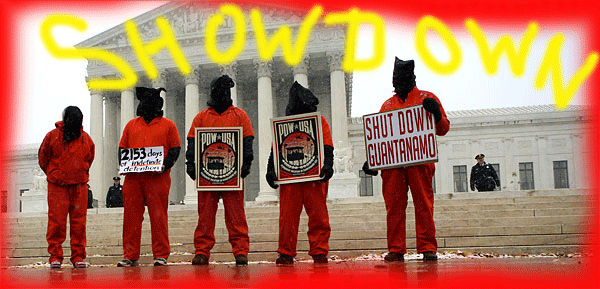
Today’s papers are loaded with articles and opinions about yesterday’s SCOTUS hearings that, with a brand new case, are again addressing the issue of whether the prisoners at Guantanamo should be able to challenge their detentions with some sort of due process. (Writs of Habeas Corpus would be nice.)
Such cases have gone before the Supremes twice before, and both times the court ruled in favor of the detainees. But then Congress stepped in with the Military Tribunals Act, (a horrid little piece of legislation that should shame any Dem who voted in its favor). And so the issue came back to the court. Yet, this time it was being heard before a SCOTUS that has a more conservative make up than the former court, with right-leaning Justice Kennedy again the likely swing vote. Today’s stories are mostly about handicapping the deepening divisions within the court as they affect this important case.
The New York Times describes how the Supremes appear ready to uphold some rights for the detainees, although how many rights and which ones—for instance, whether the court would consider reinstating Habeas Corpus —is very much open to question.
Part of what is being considered with this case is matter of the Military Tribunals and their legality. As the WaPo put it, “….even if the court holds that the captives have a constitutional right to challenge their detention, the next question would be whether the military tribunals used to determine whether the suspects may be held indefinitely as enemy combatants are an adequate substitute for habeas proceedings.”
It’s a fascinating case with far reaching implications for the country, and the arguments drew a full house of watchers, including a bunch of senators. So far the best account of yesterday’s high points was written by Tony Mauro at Law.com, who set the scene with dramatic flourish:
He described how on one side of the battle Solicitor General Paul Clement argued the position of the Bush administration, on the other side, there was former Solictor General arguing for the detainees:
“The political branch has spoken,” declared Solicitor General Paul Clement, who argued that the appeals process spelled out by Congress in the Military Commissions Act of 2006 gives detainees substantial appeal rights that amount to a “remarkable liberalization of the writ” of habeas corpus, not a retrenchment.
But former Solicitor General Seth Waxman, representing 37 Guantanamo detainees, argued just as forcefully that in the nearly six years they have been confined, the detainees have never been able to challenge their detentions before a neutral decision-maker, and “they have no prospect of getting that opportunity.” Waxman also said, “The time for experimentation is over.”
AND
Waxman’s chief nemesis was Justice Antonin Scalia, who repeatedly challenged him to name a single case in U.S. or British legal history in which a foreign alien imprisoned outside a nation’s sovereign territory had been given habeas rights.
Waxman said the Court had already decided in Rasul v. Bush that Guantanamo was effectively under U.S. control. He insisted that, in fact, the federal government had more power over the detainees in Guantánamo, which is under U.S. military control under an agreement with Cuba, than it would if they were in prison in Kentucky, where state sovereignty could come into play.
Waxman also offered up case after case to answer Scalia’s query, only to have Scalia disagree with each one. “Line them up,” Scalia taunted Waxman at one point. Eventually Waxman surrendered so he could move on to other points, telling the Court with a smile, “I have to plead exhaustion.”
AND FINALLY
Waxman told the justices about Murat Kornaz, a German resident and Guantanamo detainee who was released in 2006 after years of unsuccessful efforts to prove that he had no relationship to terrorists. Coincidentally, The Washington Post ran a lengthy story about Kornaz on Wednesday.
Kornaz was able to win his freedom only because he had a lawyer — which the new appeals process does not guarantee — and because he was able to obtain information about the charges against him and then prove the information was false, according to Waxman.
Those opportunities would not be available to detainees under the appeals process envisioned by Congress, Waxman said. “That is why it is inadequate.”
I have no doubt that day we will look back on these Gitmo detentions with great sadness and shame. But the Supremes have the opportunity to lessen that shame by their intervention. Let’s hope they can come together long enough to do it.
(Photo by Doug Mills, NY Times.)

I find it curious that one of the arguments made by the Government is that US law doesn’t apply since they’re not on US soil. Someone alert Castro!
One of the internees there is represnted by Erwin Chemerinsky. He was on KPFK yesterday with Jon Weiner who teaches history at UCI. Well, alert the righties. Lets go after Erwin again!
Why don’t we let the rule of law determine the outcome rather than your protests? But, as usual, you want justices to rule that the law says something that it doesn’t. You guys sure fall all over yourselves to worry about helping people who want to kill us.
Gee! I thought going to the Supremes and arguing Habeas and the like was all about following the Rule of Law.
Silly me!
I’m beginning to see a pattern in Woody’s presence here.
And, I’ve never seen any constructive purpose in reg’s presence here.